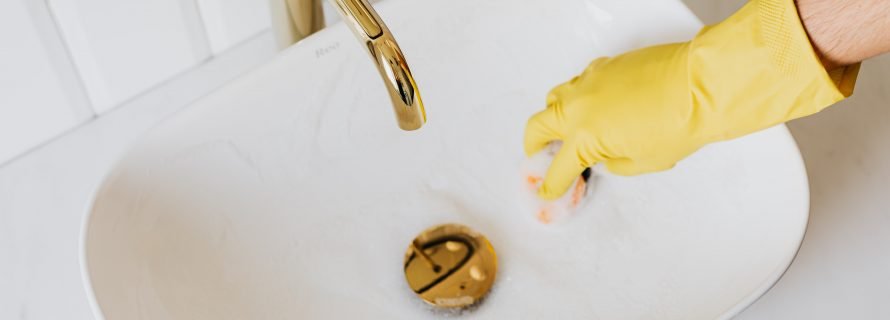The Dangers of DIY Drain Clearing

A clogged drain is so common that practically every homeowner has to deal with it at some point.
On the surface, unclogging a blocked drain sounds simple enough. In most cases, people just pour chemical cleaner down the drain and wait for it to eat through the gunk.
Others take to using what is commonly referred to as a drain snake. A long, slender, and flexible auger, a typical manual drain snake has a handle on one end that you need to crank once you’ve pushed the other end down the drain to remove whatever it is that’s blocking it. There are also electrical drain snakes that provide more power when trying to remove blockages.
However, one can’t help but wonder if doing the drain clearing yourself is the best solution for one of the most prevalent plumbing emergencies out there. Some may not realize this, but the drain itself is home to some dangers that could affect one’s health. Even the above-mentioned common drain solutions present some risk.
Let’s take a closer look at some of the dangers that come with DIY drain clearing.
Bacteria-filled Drain Water
We wash off whatever dirt we have on things and our bodies with water, which goes down the drain. When a drain is blocked, that already filthy water is bound to become even more disgusting, as it just sits there, unable to flow anywhere.
The filthier the water is, the more it becomes a favorite breeding ground of bacteria. Salmonella and E. coli are typically present bacteria in drain water, and they both present a serious risk to your health.
Ideally, a serious drain clog should be immediately referred to a professional plumber. With their tools, safety gear, and experience, plumbing professionals should be able to remove the clog with minimal to no contact with bacteria-filled drain water.
Dangerous Gases
When our drains get clogged, whatever trapped biological matter there is down there will soon begin to decay and produce hazardous gases such as methane, ammonia, and carbon monoxide.
If you’re doing DIY drain clearing and you’re not wearing a face mask at the very least, you are in danger of exposure to these toxic gases, which could put your health at risk.
Using Hazardous Chemical Drain Cleaners
More often than not, a homeowner’s initial response to a clogged drain is to run off to the store and buy some industrial-strength drain cleaner brand.
Using chemical drain cleaners would be a good way of removing any drain blockage, that is, if only they don’t eat away at seals and concrete holding pipes together. Some drain cleaners are even powerful enough to warp or damage plastic and older metal pipes.
You also need to take into account the health hazards of commercial drain cleaners. These drain cleaners’ chemical content can put you or anyone in your family at risk if you accidentally inhale, swallow, or come into dermal contact with them. These drain cleaners can cause respiratory irritation, chemical burns, and other serious health effects.
Drain Snakes May Do More Harm Than Good
Another popular way of dealing with a clogged DIY style is the use of drain snakes. Many people believe drain blockage removal is easy once the other end of a drain snake makes it down the drain.
The problem with drain snakes—both manual and electric—is that they are likely to scrape the sides of your drain pipes as you twist and pull on them. Sometimes, they could even cause cracks in the pipes that may eventually deteriorate into breaks and lead to leaks.
Professional plumbers also use drain snakes, but they are typically much better at using them carefully and safely than the average homeowner. Plumbers are experts at operating drain snakes and aren’t likely to damage your drain pipes when unclogging your drain.
For a homeowner, it’s absolutely tempting to clear a clogged drain without professional help. DIY drain clearing is probably okay if a plunger is enough to dislodge a blockage. If the drain remains clogged after minutes of vigorous plunger pumping, it’s probably time to call a professional plumber.
With their expertise, equipment, and experience, plumbers can clear your drain quickly and in the safest way possible.
About the Author: Rachel Anderson is the Content Marketing Strategist of Arizona Fire & Water Restoration, Inc., a Phoenix-based company that provides water, fire and smoke damage restoration as well as mold remediation and removal services. When not writing, she plays bowling and goes on trail hikes with her friends.
Photo by Karolina Grabowska from Pexels
- Additions and New Construction
- All Exteriors
- Alterations
- Basements
- Bathrooms
- Customer Service
- Customer Stories
- Decks
- Design & Planning Show
- DIY
- Doors
- Educational Resources
- Extreme Makeover Home Edition
- Fashion Show
- General Remodeling
- Green Living
- Handyman Home Services
- Home Decor
- Home Entertainment
- Home Improvement
- Home Improvements
- How to Tips
- In The Community
- Kitchens
- Off-the-Wall Remodeling Stories
- Remodeling
- Resources
- Roofing
- Siding
- Social Media
- Sunrooms
- Tips & Tricks
- Trends
- Windows

